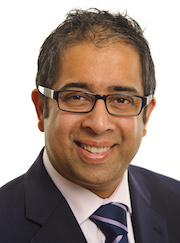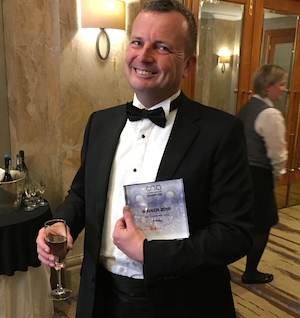 Placing innovation and diversity at the centre of all strategic campaigns is the only way to compete and survive in a fiercely competitive market, according to Silver Lining Convergence Managing Director Allan Packer.
Placing innovation and diversity at the centre of all strategic campaigns is the only way to compete and survive in a fiercely competitive market, according to Silver Lining Convergence Managing Director Allan Packer.
A combination of self-belief and the strong influence of previous work experiences, leadership mentors and company cultures set Packer on the road to building a successful and creative business with long-term viability. His career began on the Isle of Wight after leaving college at 18 to become a telemarketer. Three years later, following redundancy, he joined Sotel which was opening a call centre on the island. "I was interviewed by Dave Bramley," recalled Packer. "He was one of the owners and a great guy. I said to him, 'I am prepared to work hard, I just want an opportunity at making something of myself'."
Having secured the position, Packer soon made his mark and became the number one telemarketer every month, at the same time showing an equal zest to learn more about the technology, products and services. "I loved the spirit of the company, it had a great ethos," he stated. "Dave Bramley and Jim Thatcher were great leaders with vision and they made everyone feel valued and part of something special. That has stuck with me all these years, and I have always felt that if I can emulate that in my business, everything else will follow."
Aiming to replicate this model, take control and turn ambition into action Packer set up Fareham-based Silver Lining Convergence in 2007 with two friends. "I was frustrated with the job I was in at the time and wanted to do things my way," he stated "I guess I wasn't destined to be an employee for ever and had to be in control of my own destiny despite the country being in the absolute pit of a recession. My friends and family thought it was crazy, but my wife supported and encouraged me to do what I thought was right.
"We started out in an industrialised unit in Gosport. Whenever we were tempted by new offices we managed to differentiate between sanity and vanity and invested the money in people instead. Once we had grown to a certain point, we knew it was time to relocate for both the image of the business but also for the wellbeing of our people. An opportunity arose for us to move into a great building locally called The Granary. It has lots of character, loads of parking, great outdoor space, it's well located and a great environment for everyone to work in. Moving to our new offices in June 2015 was a significant milestone for us."
Packer took an early view that for Silver Lining to be master of its own destiny he needed to create a true converged solutions provider of both communications and IT services. "Working with partners for IT support and services just wasn't effective," he stated. "This is important as the market is evolving at such a rate and the risk of attrition of traditional telecoms revenues is getting ever greater."
Silver Lining provides managed voice, IT, data and mobile solutions to businesses, focusing on managed services, creative solutions and customised products and services. "We aim to organically grow our business through the diversification and evolution of our portfolio," added Packer. "We are currently focused on PCI compliance solutions and comprehensive enterprise hybrid cloud solutions. There is an opportunity to drive innovation in the way cloud services are served to both resellers and customers, so we created our new Revolution Cloud platform. We have spent the last two years on planning, building and commercial modelling. Over the next three months we are launching our new cloud offering in stages and everyone from our technical guys, to sales, operations and even some of our partners are so excited about it."
Where others have rushed to market and failed, Packer believes that the groundwork done over the last two years provides a springboard for growth. "We talk about cloud in a far more comprehensive way than many of our competitors," he stated. "We are looking to provide an entire suite of services from the connection to the desktop, back up, compliance, voice and much more. We are looking to deliver this securely from a single managed platform with guaranteed performance and service ."
Another turning point in the context of this strategy was bringing onboard a new business partner and investor, Peter Appleton. "As we drive the business down a more converged communications path focusing on becoming a true converged solution provider with our own ISP and cloud offering, we really benefit from Peter's expertise in the ISP and cloud arena," added Packer.
The company currently employs 40 staff and generates £7 million-plus revenues. In financial year 2013 Silver Lining generated £2.6 million turnover but the introduction of new cloud services and PCI solutions significantly catalysed revenues to over £6 million in 2014. "With rapid growth comes a variety of expansion challenges," added Packer. "One of our big issues is getting the extra skills and resource we need. Recruitment can be a slow process. Our strategy has been to demonstrate that we have something exciting and new to work on, and that captures the interest and imagination of candidates."
The main strands of Packer's growth strategy are working with partners to speed up Silver Lining's route to market. "As a small business we have historically relied on referral and word of mouth for us to penetrate the market," he said. "We are now focusing more heavily on targeted event-based marketing activities and partner procurement. We see the partner channel route as being a major part of our strategy for growth over the next two to three years."
Packer also wants to enhance the company's position within its base as a managed solutions provider, which is partly why he was an early innovator of PCI solutions. "This helped us achieve significant growth and also opened up a number of doors into some great new opportunities," he commented. "It also demonstrated to our customers and our staff that innovation and diversity is good for both growth and security in the business."
In terms of diversity, if Packer finds a gap in the market he will try to fill it creatively. "We recently started providing TVs and Wi-Fi to hotels," he explained. "However, we wanted to do it better so developed our own hospitality TV and Wi-Fi controller based solution. There will undoubtedly be more gaps in the market that come to light and as they do we will work to fill them. We are technically led and excited by the potential of evolving and customising technology. This approach leads us by referral into some exciting opportunities whether it be providing cloud services to the NHS or developing a completely new emergency communications system for the RNLI."
Packer also monitors regulatory changes in the industry to determine his innovation strategy. "Two years ago regulatory changes steered us to PCI, more recently we are launching some new lone worker solutions that we have designed and developed in house," he explained. "If you can make problem solving easy and affordable everyone is a winner. Having our own development team and constantly trying to be aware of the challenges our customers face helps us to define which solutions we invest time and money into developing."
Packer is also keeping a close eye on commodity attrition, as many of the commodities that telecoms businesses have relied upon such as call and data revenue are declining: Bandwidth pricing is constantly reducing, most inbound revenue is moving from higher value mediums such as 0800 and 084x to lower value 033 or even back to geographic numbers. And outbound call charges are disappearing with the introduction of low cost calls on SIP and call packages on SIP trunks.
"This means we have to focus on diversifying our products and constantly evolving to ensure that we have solutions and value added propositions to both maintain commodity income but also diversify away from it," he commented.
According to Packer, if resellers don't evolve to offer true value add they are likely to go 'extinct'. "A lot of businesses are jumping on the bandwagon of hosted voice, but these revenues are already at risk and resellers are going to have to innovate and diversify to maintain revenues and profitability in a market that is becoming ever more challenging," he commented. "Ultimately, we will see less resellers, but those that survive will be offering more creative and bespoke solutions."
Packer rates his ability to read the market and constantly evolve as his biggest achievement. "If we had sat back after a couple of years and patted ourselves on the back we wouldn't be where we are today," he said. "Diversifying our business into PCI, IT and eventually cloud has given us an edge. It involved a significant investment and was risky at the time, but worth it."•
 At several stages in your career you will decide to move job, and in present times your resignation is likely to generate a counter-offer to stay, writes Clive Jefferys, Managing Director of recruiter JMA Network.
At several stages in your career you will decide to move job, and in present times your resignation is likely to generate a counter-offer to stay, writes Clive Jefferys, Managing Director of recruiter JMA Network.
 Gamma's Daryl Pile has pledged to elevate the company's partner strategy following his promotion to the role of Channel Managing Director in September.
Gamma's Daryl Pile has pledged to elevate the company's partner strategy following his promotion to the role of Channel Managing Director in September. Placing innovation and diversity at the centre of all strategic campaigns is the only way to compete and survive in a fiercely competitive market, according to Silver Lining Convergence Managing Director Allan Packer.
Placing innovation and diversity at the centre of all strategic campaigns is the only way to compete and survive in a fiercely competitive market, according to Silver Lining Convergence Managing Director Allan Packer. Cradlepoint has big growth plans in EMEA and the man spearheading its channel expansion campaign is Hubert Da Costa, Vice President of EMEA, whose career path and industry experience dovetails neatly with the US-based company's expanding global ambitions.
Cradlepoint has big growth plans in EMEA and the man spearheading its channel expansion campaign is Hubert Da Costa, Vice President of EMEA, whose career path and industry experience dovetails neatly with the US-based company's expanding global ambitions. Avaya's revised go-to-market strategy for Aura Communications Manager could have potentially silenced the vendor's voice in the very market where it wants to make most noise, providing an opportunity for IP Netix to turn up the volume as a staunch Avaya services partner, says Managing Director Kevin Boyer.
Avaya's revised go-to-market strategy for Aura Communications Manager could have potentially silenced the vendor's voice in the very market where it wants to make most noise, providing an opportunity for IP Netix to turn up the volume as a staunch Avaya services partner, says Managing Director Kevin Boyer. Enter White Horse Telecom Managing Director Paddy Coppinger, a former helicopter pilot and seller of Magic Trees who branched into telecoms and is aiming for a knighthood.
Enter White Horse Telecom Managing Director Paddy Coppinger, a former helicopter pilot and seller of Magic Trees who branched into telecoms and is aiming for a knighthood. Being recognised as one of the fastest growing technology businesses in the UK for the second year in succession is a big achievement for service provider Channel Telecom, but owner and Managing Director Clifford Norton believes the best is still to come.
Being recognised as one of the fastest growing technology businesses in the UK for the second year in succession is a big achievement for service provider Channel Telecom, but owner and Managing Director Clifford Norton believes the best is still to come.